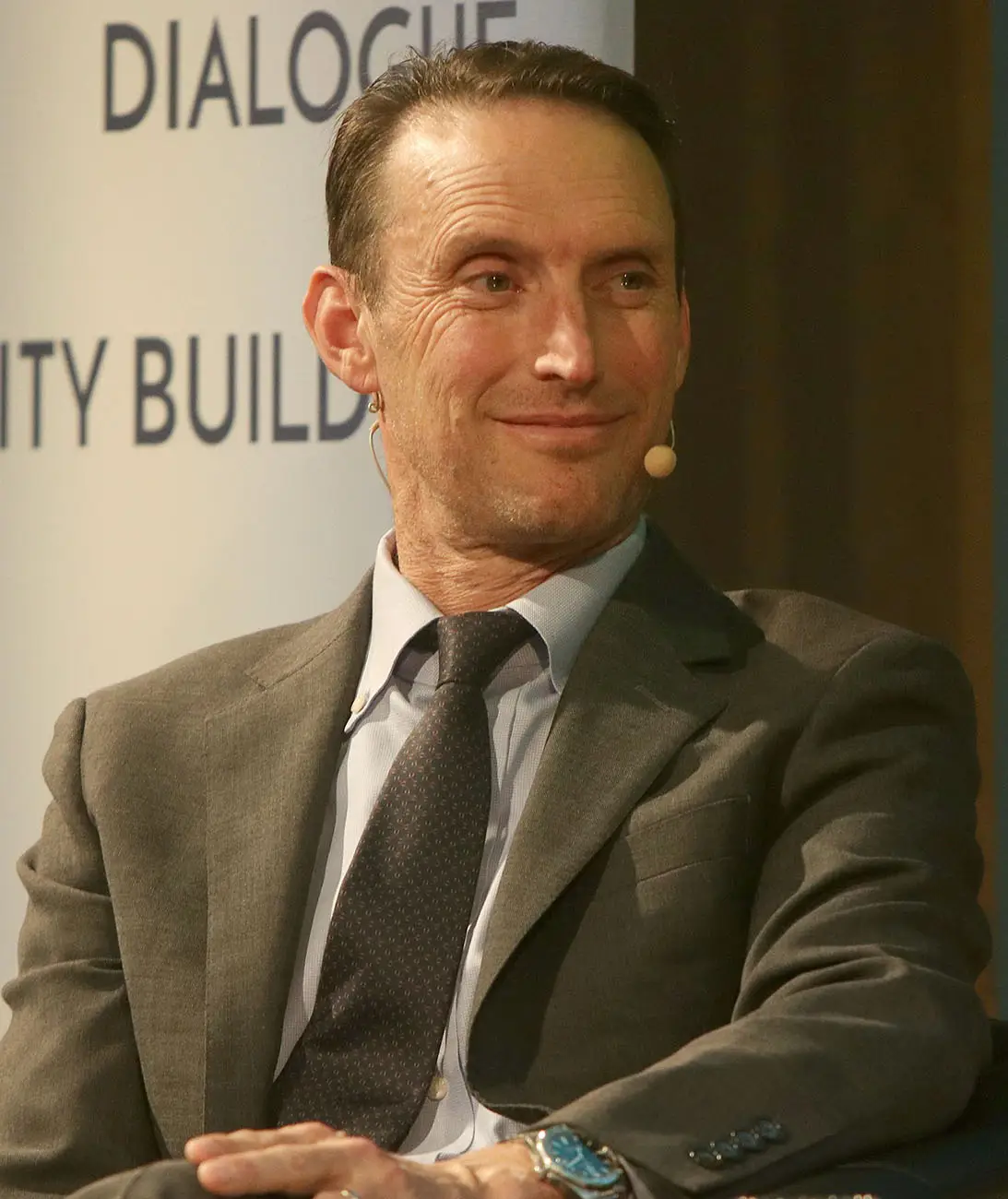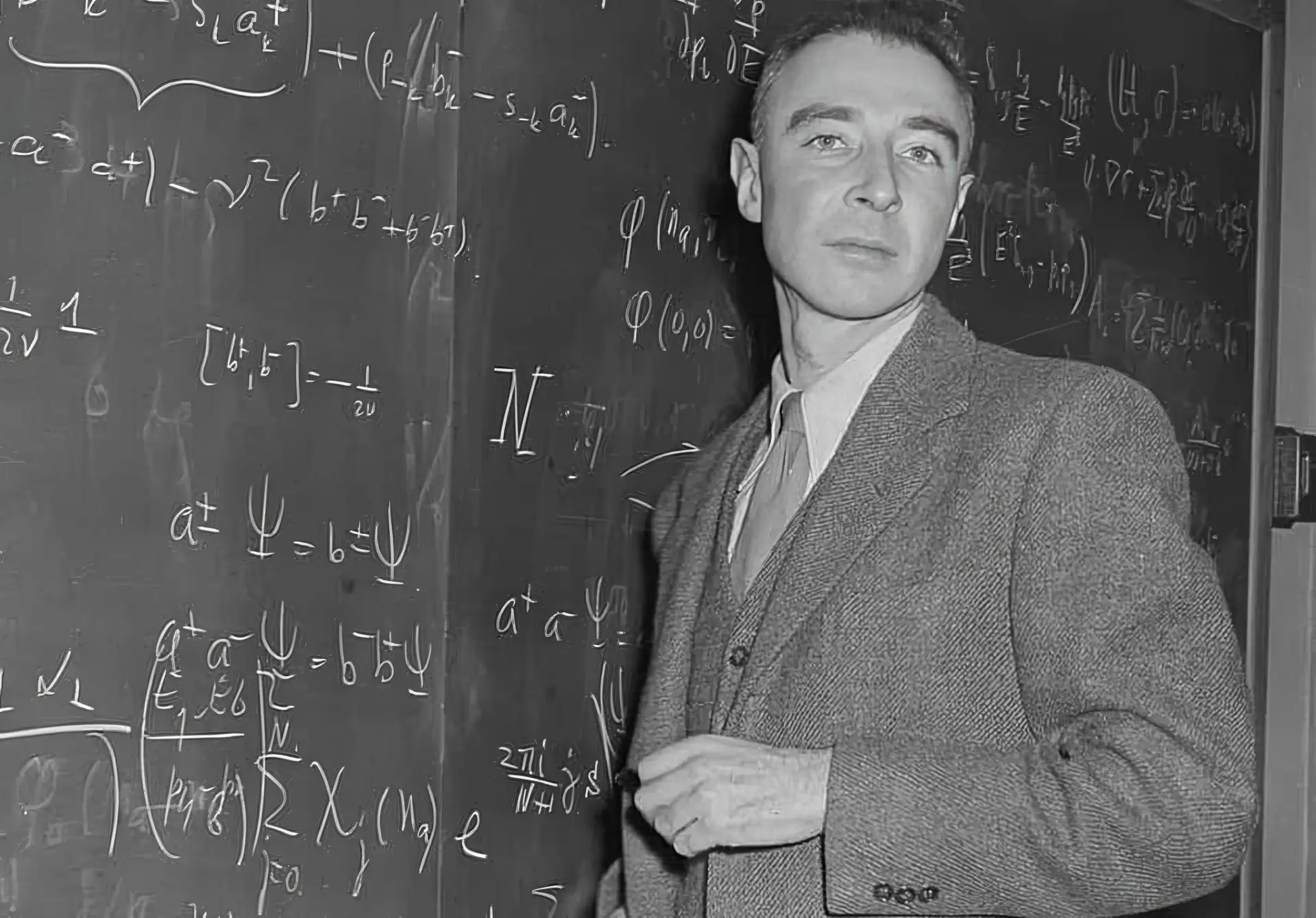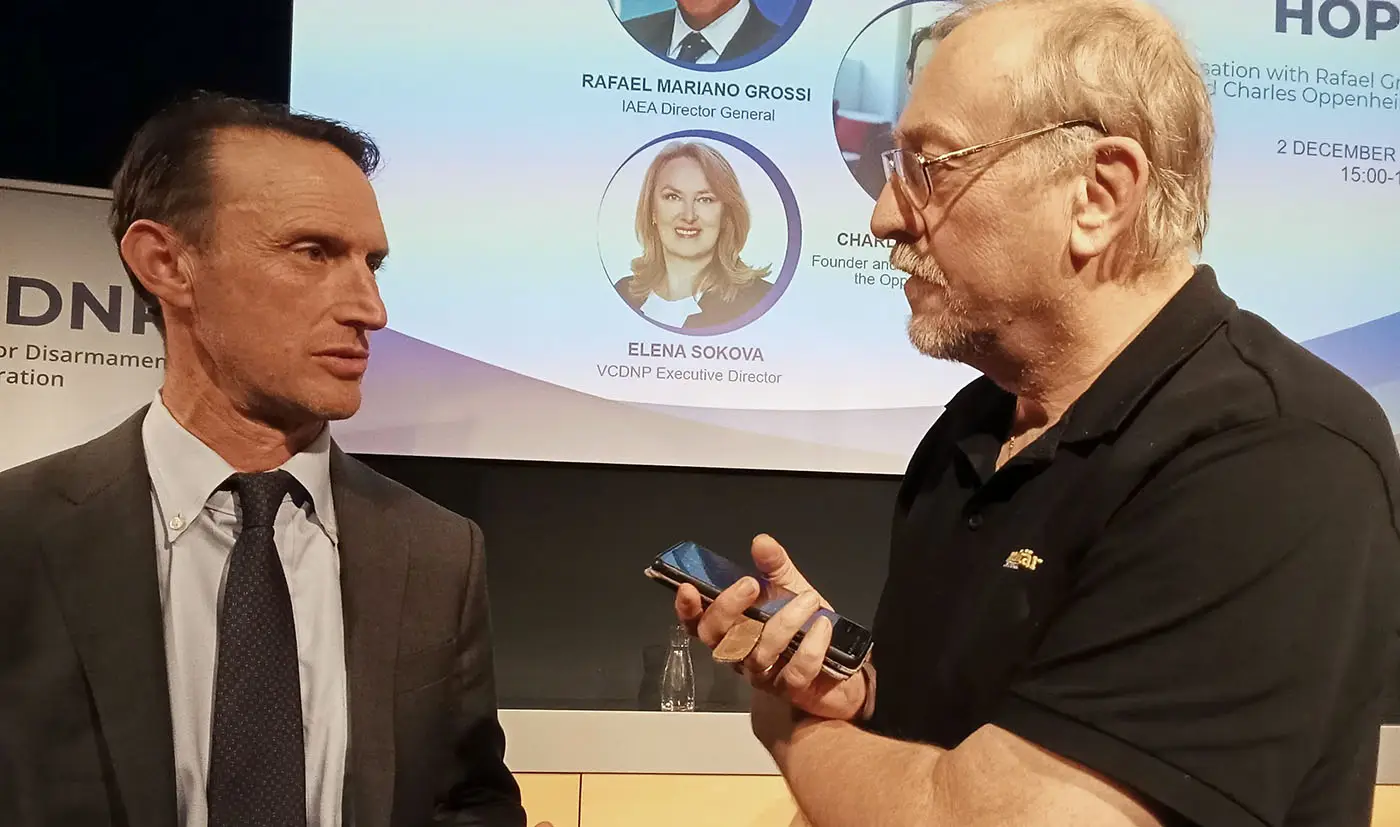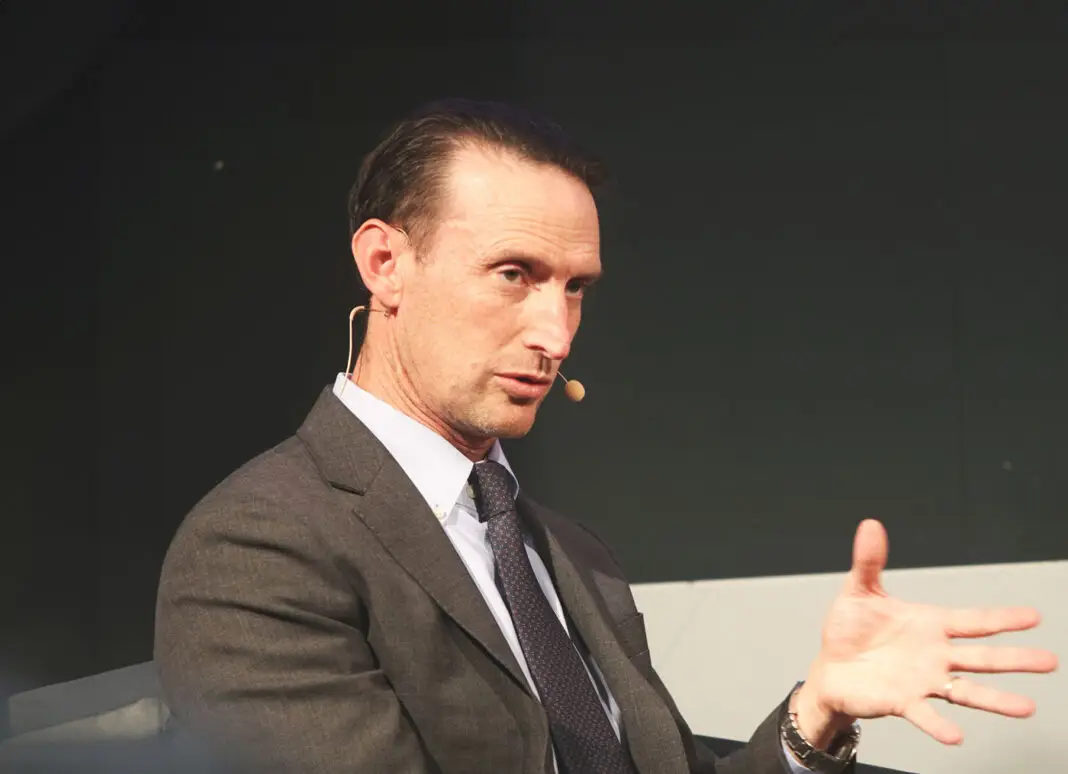On December 2, the Vienna Center for Disarmament and Non-Proliferation (VCDNP), located in the Andromeda Tower in Vienna’s Donau-City, hosted a high-profile discussion entitled “Powering Hope – A Conversation with Rafael Grossi and Charles Oppenheimer”. Militär Aktuell took the opportunity to ask questions and then exchange views with the grandson of a key player in the Manhattan Project. Charles Oppenheimer is Founder & Co-Executive Director of the so-called “Oppenheimer Project”.

Mr. Oppenheimer, how much time did you actually spend with your grandfather? He died in 1976, and what remains of him to this day is that he then strongly questioned his own work.
I was born in 1975, so I never got to know him. But I knew my uncle Frank, who also appears in the movie “Oppenheimer” by Christopher Nolan. I would have loved to talk to my grandfather about the Manhattan Project and his role in it. I always say the Oscars are over, but I will be an Oppenheimer for the rest of my life. We as a family didn’t have much control or influence over the movie. I talked to Mr. Nolan and went to the film sets, but when you’re dealing with fame and history, you have no control over that. But I was really pleased with the result he achieved. The movie opened a lot of people’s eyes. Believe me, a lot of younger people had never heard of Oppenheimer and the Manhattan Project. Right at the time when the Ukraine conflict (-> current news from the Ukraine war) and the AI nexus came to the fore and the threat of nuclear weapons entered the public consciousness anew, the film was released. Prior to this, the topic of nuclear weapons had disappeared from general awareness and many people had far too little fear of them. But the danger has not been banished, it has not been solved and it is not over. Contrary to fears, the film was not a work about scientists or heroes who save everything. Rather, it is very neutral, which allows us to tell a story about what the future should look like. I can take action myself and apply my ideas to the world. I am not alone; many people and activists have since made a difference. This is the hopefully lasting result of the movie. This phase will not last forever. The awareness of the family name has been helpful and we are trying to capitalize on that attention. In doing so, we are striving to get my grandfather’s philosophy of true values out into the world.
You call it the “Oppenheimer project” that you presented here. But what is your starting point for dealing with these issues? Where do you stand?
The ideal starting point is my grandfather’s legacy. However, the efforts of our project have only emerged in the form in which I have been actively talking about the topic over the past five years. There is an important role for non-profit organizations and NGOs with a background or name like ours to join the discussion, take action and engage the public – such as the event with the International Atomic Energy Agency in Vienna. It will take a while before we can take the step to the political level. We need both such institutions and the support of national governments. I have never gone anywhere and immediately said: “I am the grandson of the father of the atomic bomb”, but the name opens doors and facilitates dialog with important people.

But what is the “lever” of your organization? Where do you start with your nuclear non-proliferation activities?
You know, some donors in the non-proliferation field had already lost hope. There was a certain amount of philanthropic funding for peace and security, but after ten or twenty years, many realized that their contributions were not making a difference. The system is just too big and unmanageable. I have moved a lot in circles that include financial institutions, large institutional donors and also individuals who want to make a difference but also want to get their money back. Investments need to be seen as viable, ideally in conjunction with government tax incentives and public-private partnerships. If you can create an investment opportunity for private companies to get their capital back, it can generate a significantly larger funding stream than a single country could raise on its own.
 I hope that the most influential people in the world – nowadays mostly dozens of billionaires who also influence elections through their influence – realize that they can make a contribution to world peace. This is of the utmost importance. There is nothing more important than the question of whether we wipe ourselves out with nuclear weapons or achieve a future with enormous energy wealth and a large amount of carbon-free energy. That’s why I’m campaigning with my friends in Silicon Valley to emphasize that more can be done on the issues that matter – not just the “politically correct# charities that are currently in the spotlight.
I hope that the most influential people in the world – nowadays mostly dozens of billionaires who also influence elections through their influence – realize that they can make a contribution to world peace. This is of the utmost importance. There is nothing more important than the question of whether we wipe ourselves out with nuclear weapons or achieve a future with enormous energy wealth and a large amount of carbon-free energy. That’s why I’m campaigning with my friends in Silicon Valley to emphasize that more can be done on the issues that matter – not just the “politically correct# charities that are currently in the spotlight.
Is there now a better climate for such initiatives in the USA? Or is this expected because the issue is possibly a small part of Donald Trump’s “Make America Great Again” (MAGA) agenda? After all, the nuclear issue has made America great – and continues to do so.
There is some chance. Nuclear energy is more popular than ever and is a bipartisan issue in the US. So the MAGA agenda doesn’t necessarily hurt the energy debate. However, whether this opens a path to nuclear arms reduction is uncertain. Still, there may be a way to move forward in the new climate of the incoming administration. The incoming “re-president” has always warned against a third world war, but all modern governments are working to upgrade their nuclear arsenals and delivery systems – the US also has an extensive modernization program underway. However, there is a chance that a second Trump term would be more willing to negotiate directly with China and Russia on weapons categories and limitations.
“If we agree on nothing else, it’s the fact that we don’t want an automated, AI-controlled nuclear war.”
Finally, I would like to talk briefly about something that we write a lot about and that many people describe as having a similar impact to the atomic bomb: Artificial intelligence. Does this topic also play a major role in your thoughts and activities?
Of course. Do you know how many times I’ve been forced to talk about AI in the past year or two? There are significant technical differences to the dissemination of my grandfather’s ideas. The control of critical material that was a reality back then is no longer possible today. Everyone recognizes that AI is fundamentally not controllable in this way. It is therefore better to acknowledge reality. The question of whether we are doing something to humanity with AI that will then be our undoing is one of humanity’s oldest myths, isn’t it? It’s the oldest story that all cultures share – like Adam and Eve or Prometheus. There is a reason why we are confronted with this question again and again. Robert Oppenheimer and his experiences changed the world, and we see a similar element manifesting itself in AI. So how do we deal with it? The right way is acceptance. We should not pretend it is something else or that it can be stopped or “caught”. Dealing with the resulting threats requires not only technical specifications and regulations, but also the ability to talk to potential adversaries. It is about finding areas of common interest. Of course, it’s hard to be hopeful given the world as it is right now. But I have managed to do it, and I believe that, especially with AI, cooperation with the world’s most restless players could be useful. You could say with them, “If we agree on nothing else, let’s agree on the fact that we don’t want automated, AI-driven nuclear war.” Such conversations could create small elements of dialog and hope that emerge from this technological shift.











